#b2b ecommerce software solutions
Link
In searching of B2B eCommerce agency for your business needs? Closeloop is your one-stop B2C and B2B eCommerce development agency with full-stack web development capabilities. We focus on simplifying your eCommerce portal by using user-friendly navigation and powerful integrations for smooth purchases backed with secure database development and payment options. Need to talk to our experts? Visit us today!
#b2b ecommerce agency#b2b ecommerce software solutions#b2c b2b ecommerce software solutions#b2c b2b ecommerce agency#b2c ecommerce agency#b2b ecommerce solutions
1 note
·
View note
Text
7 Tips to Design an Excellent UX of a B2B eCommerce Platform
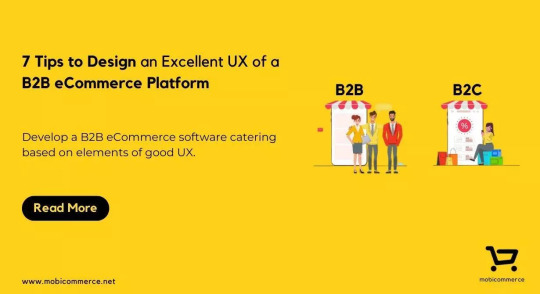
Imagine if you have various products in your store, and still, you are not able to generate enough sales from your store.
What could be the reason?
According to Adobe research, 38% of online shoppers don’t purchase from the website when they feel the design is unattractive to the store.
So, you need to focus on the user experience of your eCommerce platform. A good user experience helps your users engage and encourage them to make purchases. The more easy actions of purchasing any product, the increase the chances of sales.
That’s the reason why you should focus on the user experience of your website, and making your website easy to navigate, helps you to increase purchases. Let’s get started to know the tips that actually help you design an attractive UX for your eCommerce platform.
What is eCommerce User Experience?
eCommerce user experience means designing a familiar interface from the end user’s point of view and figuring out how you will provide your users a simple, enjoyable, and logical online shopping.
eCommerce user experience is about creating a user journey to know how a user will interact with your website.
If you are unable to keep the smooth user experience of your eCommerce platform, then there are chances that your users might abandon the cart.
As a result, you face massive abandon carts in your eCommerce application, where your users left your B2B eCommerce platform in-between making purchases.
As you know, user experience is essential to attract and retain the users to your platform, and let us know the reasons why user experience is a key element when building an eCommerce platform.
A B2B eCommerce platform is not similar to a B2C platform because B2B products include a detailed description of product specs, technical information, product compatibility data, and even comparison options with other relevant products.
The buying process in B2B is different than in B2C because the B2B buying process includes some common administrative duties. So, all the administration should be easy to perform and less complicated.
A satisfactory B2B eCommerce platform makes the users’ navigation easy for the end-users. It reduces the time and efforts of buyers in searching for categories, top products, discounted products, and product filters.
The less complexity in the B2B eCommerce platform results in more engagement.
Most B2B eCommerce software solutions have a massive catalog of thousands or millions of products, so providing on-site search is essential. This way, your users can search the product for and land on your website.
Considering all the above-listed points, it has now become clear why UX is essential for your business.
To design a user-centric UX for your B2B eCommerce platform, you must consider various design elements.
Here are the tips that will help you develop a B2B eCommerce software catering based on elements of good UX.
7 Tips to Design a User-centric and Attractive User Experience for Your eCommerce Platform
1) Offer Smooth User Experience on Your B2B eCommerce Website
Make it easy for your users to navigation easy to your website. Your whole user journey from searching for products to making a purchase should be smooth without any user-facing errors. To offer the best user experience to your site, you need to offer the following things.
Buyer-specific payment or shipping methods
Saving the order lists in the carts
Option of flexible pricing
Create purchase orders
Ability to review the orders
2) Place Call-To-Buttons in the Right Places
On any eCommerce website, CTAs are the most crucial design element and effective for results, so make sure to keep CTAs in the right place, and your CTAs should be easy to find by users.
Keeping the eye-catching CTAs on your website draws your customer’s attention and tempts them to take action on your website.
3) Voice Search and Shopping in Your Mobile Platform
Over the last few years, the curiosity about voice search features increasing in eCommerce platforms. Siri and Alexa are the two most popular accurate voice assistants offering results when asking something. In addition, today people want to shop using voice assistants.
Adding this feature to your mobile B2B eCommerce platform will enhance your platform results. But, make sure when you add this feature, it is easily accessible in your store for your end-users. So, when you hire an eCommerce developer, ask him/her to place it at a visible place in the store.
4) Place Relatable and Effective Content on Your Website
When you design your B2B eCommerce store, you should need focus on your content part. In B2B eCommerce sites, content is also essential because... Read more about Designing an Excellent UX of a B2B eCommerce Platform
#b2b eCommerce platform#b2b eCommerce software solutions#eCommerce development company#B2B ecommerce user experience
0 notes
Text
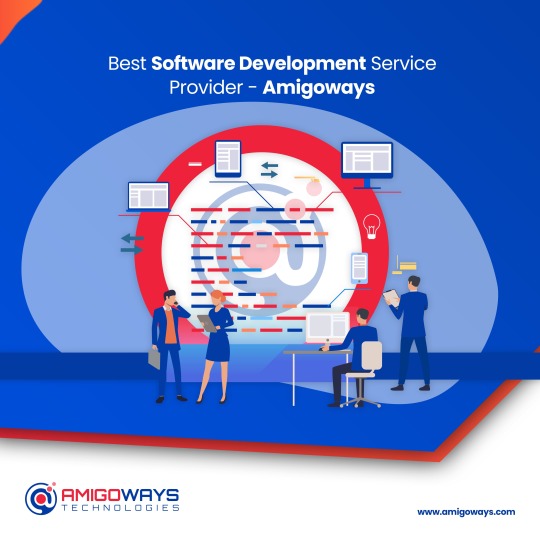
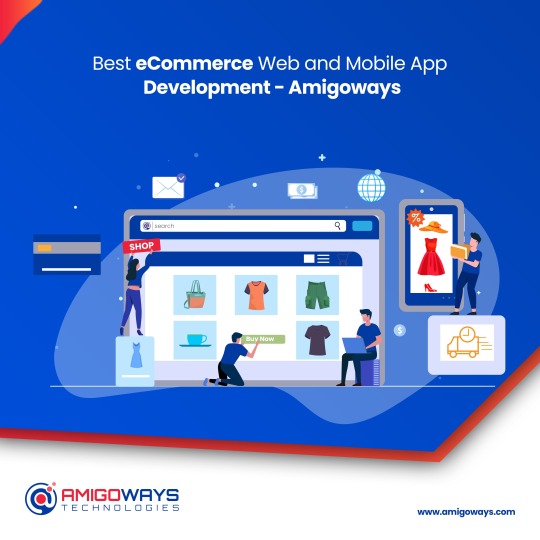
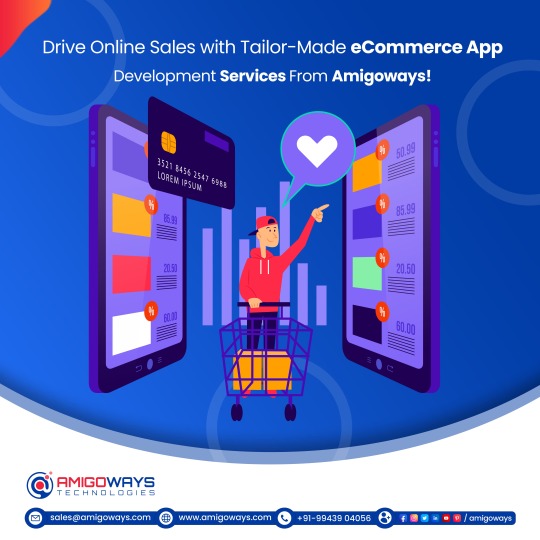
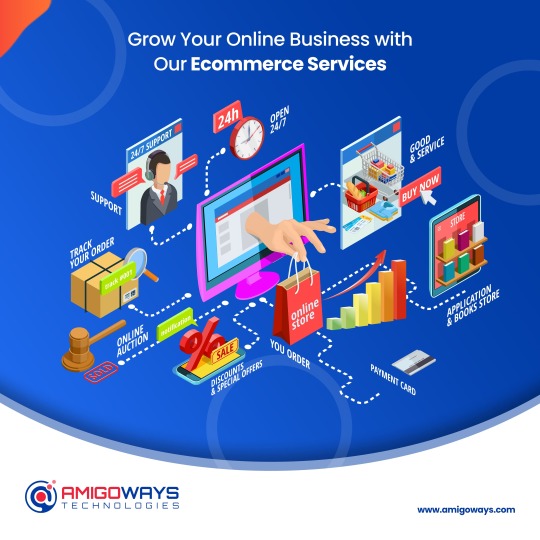
Top eCommerce Development In Tamil Nadu
Amigoways is one of the most trusted eCommerce development company in Madurai, We offer effective and successful eCommerce website & extension development for all types of B2B & B2C organizations. Amigoways is a team of well-trained, certified tech professionals who structure your venture with a business suite. Our multitude of services for your business upliftment on the business market.
Our eCommerce Development Services
Custom ECommerce Development
API Integration & Customization
Data Maintenance & Migration
ECommerce Audit & Optimisation
ECommerce Data Analytics
ECommerce Consulting
Business Intelligence
To know more about eCommerce development services Tap on - https://www.amigoways.com/ecommerce-development/
#ecommerce website development in madurai#Multi Vendor eCommerce Services in Tamil Nadu#top Multi Vendor eCommerce Services in Tamil Nadu#b2b ecommerce software solutions in madurai#multi vendor clone script madurai
0 notes
Text
Gainz Retail ERP support both B2B and B2B ecommerce, point of sale, mobile POS, order and inventory management, invoicing, financials, payroll, CRM and support so you can focus on your customers.
#Gainz Retail#cloud erp#erp#erp for small business#erp implementation#erp software#erpcompany#erpdevelopment#erpsolutions#sap erp#software#canada#erp system#retail#erp integration
3 notes
·
View notes
Text
Supercharge Your Business with Customized E-commerce Solutions
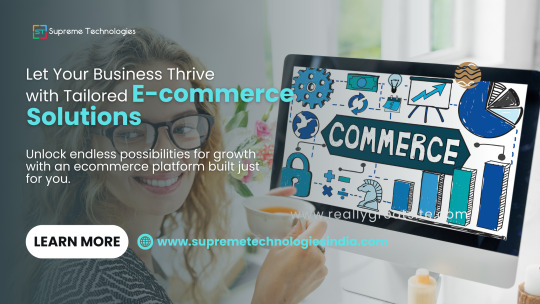
Running a business is no easy task, but having the right e-commerce solutions can make all the difference. Picture this: a smooth, hassle-free online store that practically runs itself, freeing you up to focus on growing your brand. Whether you’re catering to a loyal group of customers or breaking into new markets, the right platform can open up endless possibilities. Let’s dive into how you can level up your business with smart, tailored ecommerce strategies that fit your unique needs.
Why Ecommerce Solutions Matter
In the modern business landscape, e-commerce is no longer a luxury—it’s a necessity. Consumers expect a flawless experience from the moment they land on your website to the time they complete a purchase. Whether you’re running a B2B portal or serving individual customers, ecommerce platforms offer customizable, scalable solutions that can take your business to the next level.
With the right e-commerce platform, you can streamline your operations, manage inventory effortlessly, and provide an intuitive interface for your customers. It’s about more than just creating an online store—it’s about crafting an entire ecosystem that works seamlessly together to boost efficiency and profits.
Tailored E-commerce solutions for Every Business
Not all ecommerce solutions are created equal, and that’s where customized services come into play. The beauty of having a tailored e-commerce platform is that it can be adapted to meet your specific needs. Are you a B2B company looking to streamline operations? A specialized B2B portal allows you to manage bulk orders, negotiate prices with your clients, and offer exclusive pricing for loyal customers.
By choosing the right ecommerce solution, you can handle everything from product listing to payment gateways and customer service in one centralized location. This reduces the complexity of running an online business, allowing you to focus on what matters—delivering top-notch products and services to your customers.
Features That Make Ecommerce Solutions Shine
What sets a powerful ecommerce solution apart from the rest? Here are a few key features to look for when choosing the right platform for your business:
Scalability – As your business grows, your ecommerce platform should grow with you. A scalable solution ensures that you’re ready for increased traffic and more complex business operations.
User-Friendly Interface – An intuitive platform allows both your customers and your team to navigate with ease, ensuring that your website delivers a seamless experience.
Security – In an era where cyber threats are ever-present, a secure e-commerce solution is non-negotiable. Make sure your platform offers robust protection for both you and your customers.
Integration Capabilities – Your e-commerce platform should integrate with the tools you already use, whether it’s your CRM, email marketing software, or accounting systems.
A well-designed B2B portal will have these features baked in, ensuring that you stay ahead of the curve in this competitive landscape.
E-commerce Solutions Boost Efficiency and Sales
E-commerce platforms are more than just online stores—they’re powerful business tools that drive growth. A good ecommerce solution can automate time-consuming tasks such as inventory management, order processing, and even customer support, freeing up your time for more strategic work.
When it comes to increasing sales, ecommerce solutions can help you personalize the shopping experience. From offering special discounts to loyal customers to recommending products based on past purchases, your platform can play a crucial role in boosting conversions. Personalized experiences not only lead to higher sales but also to more satisfied, repeat customers.
Optimizing B2B E-commerce: The Future is Now
The rise of B2B e-commerce has opened new doors for businesses looking to connect with their clients in more dynamic ways. Traditional B2B companies are moving toward online platforms to manage client relationships, process bulk orders, and offer customized solutions. Whether your business is focused on wholesale or providing services to other companies, an effective B2B e-commerce platform allows for smoother transactions, better communication, and higher levels of satisfaction.
The biggest advantage of B2B e-commerce? It opens up a world of opportunities. With an efficient B2B portal, you can provide tailored experiences for each client, track their preferences, and offer personalized deals. Moreover, it streamlines purchasing processes, making it easier for clients to do business with you.
Future-Proofing Your Business with Supreme Technologies
The ecommerce landscape is constantly evolving, and your business needs a solution that can adapt to these changes. At Supreme Technologies, we pride ourselves on providing cutting-edge ecommerce solutions that meet the needs of both B2B and B2C businesses. We understand the unique challenges that come with running an online store, and we’re here to make your life easier.
From building fully customized e-commerce platforms to offering ongoing support and optimization, we’ve got you covered. Our team of experts is dedicated to helping you create a seamless online experience that will keep your customers coming back for more.
Ready to Take Your Business to the Next Level?
The future of business is online, and having the right ecommerce solutions can make all the difference. Whether you’re looking to launch a new online store or optimize an existing one, our team at Supreme Technologies is here to help. Let us build a platform that’s not only powerful and scalable but also tailored to your specific business needs.
Don’t wait—get started with our state-of-the-art ecommerce solutions today. Visit our website at Supreme Technologies to learn more and take the first step toward transforming your business with e-commerce.
#Ecommerce Solutions#B2B Portal#Enterprise Solutions#ecommerce website development#best ecommerce web development services
0 notes
Text
Ecommerce Inventory Management Software: A Comprehensive Guide
In this blog, we’ll dive into what ecommerce inventory management software is, why it’s essential for online businesses, and showcase some of the top solutions available in the market. We’ll also outline the key features to look for when choosing or developing a custom inventory management solution tailored to your business needs.

What is Ecommerce Inventory Management Software?
Ecommerce inventory management software helps online businesses manage products across multiple sales channels, optimize stock levels, and streamline processes to prevent overstocking or shortages. It tracks inventory, provides sales insights, automates order processing, and integrates with ecommerce platforms, accounting tools, and shipping providers. Centralized data management allows real-time stock updates, reduces manual errors, and enhances overall efficiency.
Essential Features of Ecommerce Inventory Management Software
Real-Time Inventory Tracking
Provides up-to-date information on stock levels across all sales channels, preventing overselling and stockouts.
Multi-Channel Integration
Synchronizes inventory levels across multiple sales platforms like Amazon, eBay, and Shopify, reducing errors and improving efficiency.
Automated Order Management
Speeds up order processing, reduces human error, and manages orders from different channels in one place.
Demand Forecasting
Analyzes historical sales data to predict future inventory needs, helping avoid overstocking or understocking.
Barcode Scanning
Simplifies inventory tracking, reduces errors, and speeds up processes like stock takes and order fulfillment.
Reporting and Analytics
Provides insights into inventory performance, helping optimize stock levels, track sales trends, and make informed decisions.
Supplier Management
Streamlines communication with suppliers, tracks orders, and manages relationships to maintain optimal stock levels.
Returns Management
Handles product returns efficiently, ensuring customer satisfaction and accurate inventory updates.
Mobile Access
Enables inventory management on the go, providing real-time updates and order management from smartphones or tablets.
Top Ecommerce Inventory Management Software Solutions
1. Zoho Inventory
A comprehensive tool for businesses of all sizes that integrates seamlessly with other Zoho apps and various ecommerce platforms. It offers features like multi-channel inventory management, automated workflows, and real-time shipping tracking.
2. Cin7
A powerful inventory and order management system designed for medium to large businesses. It supports advanced inventory tracking, real-time stock visibility across channels, and robust warehouse management features.
3. Veeqo
An all-in-one inventory management software built for growing ecommerce businesses. It provides multi-channel inventory management, shipping automation, real-time sales tracking, and returns management.
4. ShipBob
A logistics and inventory management solution tailored for direct-to-consumer ecommerce brands, offering distributed inventory across multiple fulfillment centers, automated shipping, and integrated returns management.
5. Katana Cloud Inventory
Specifically designed for manufacturers, Katana offers production scheduling, real-time inventory tracking, and integration with popular ecommerce platforms, making it ideal for businesses needing manufacturing and inventory management capabilities.
6. inFlow Inventory
A versatile inventory management software for small and medium-sized businesses that includes features like barcode scanning, sales order management, and a B2B portal for customer orders.
7. Fishbowl
An inventory management software with advanced features tailored for manufacturing and warehouse management. It provides tools for multi-location inventory management and integrates well with accounting software.
Sometimes, off-the-shelf inventory management software may not fully meet your unique needs. In such cases, opting for a custom solution could be ideal. Custom software is designed to integrate seamlessly with your existing systems, offers flexibility to adapt as your business grows, and includes dedicated support and maintenance.
Source: Ecommerce Inventory Management Software
#ecommerce inventory management software#ecommerce inventory software#inventory management software for ecommerce#best ecommerce inventory management software#best inventory software for ecommerce#inventory management software ecommerce
0 notes
Text
youtube
SILK Software’s Magento B2B Desktop Demo showcases the robust capabilities of Magento's B2B eCommerce platform. Tailored for businesses seeking streamlined operations, this demo highlights features like personalized catalogs, custom pricing, and advanced order management. Experience how SILK Software empowers B2B enterprises with a seamless and efficient digital commerce solution.
0 notes
Text
Does your business need a Growth Consultant?
A growth consultant can be instrumental for a startup, offering specialized expertise and guidance to drive business growth and navigate the complexities of scaling.
We at Camphor Solutions provide business growth consulting for consumer electronics wearables ngo social ventures heavy engineering machinery equipment companies food processing delivery logistics supply chain startups professional services ev automobile startups edtech elearning platforms wellness healthtech startups healthcare hospitals agritech agriculture startups travel tourism manufacturing industrial oem products consumer retail lifestyle products companies software it saas companies d2c ecommerce marketplaces b2b wholesale marketplace
Here’s why a growth consultant can be crucial:
1. Strategic Direction: Growth consultants help startups define and refine their growth strategy, ensuring alignment with business goals. They provide insights into market opportunities, competitive positioning, and long-term planning.
2. Data-Driven Decisions: They leverage data analytics to identify trends, measure performance, and make informed decisions. This includes analyzing customer behavior, sales data, and market trends to optimize growth strategies.
3. Market Penetration: Growth consultants assist in identifying target markets and developing strategies to enter or expand within these markets. They help in crafting effective marketing campaigns, sales strategies, and partnership opportunities.
4. Scalability Planning: Startups often face challenges when scaling operations. Growth consultants provide guidance on how to scale efficiently, including optimizing processes, technology integration, and resource allocation.
5. Optimization of Marketing Efforts: They offer expertise in various marketing channels, including digital marketing, content marketing, and social media. This ensures that marketing efforts are effective and ROI is maximized.
6. Revenue Growth: By analyzing current revenue streams and identifying new opportunities, growth consultants help in developing strategies to increase revenue. This might include pricing strategies, upselling, cross-selling, or exploring new business models.
7. Operational Efficiency: They assess existing operations and recommend improvements to increase efficiency. This could involve streamlining workflows, improving customer service, or enhancing product delivery.
8. Risk Management: Growth consultants help identify potential risks associated with growth and develop strategies to mitigate them. This includes financial risks, market risks, and operational risks.
9. Networking and Partnerships: They often have extensive networks and can connect startups with potential partners, investors, and industry experts. This can open doors to new opportunities and resources.
10. Objective Perspective: An external consultant provides an unbiased view of the business. They can offer fresh insights and identify issues that internal teams might overlook due to their proximity to the daily operations.
11. Implementation and Training: Growth consultants not only offer strategic advice but also assist in implementing growth strategies. They can provide training and support to ensure that the startup’s team is equipped to execute the plan effectively.
12. Adaptation to Market Changes: They help startups stay agile and adapt to changes in the market environment, ensuring that growth strategies remain relevant and effective in dynamic conditions.
In essence, a growth consultant brings expertise, experience, and an external perspective to a startup, facilitating smarter growth strategies, better decision-making, and more efficient scaling.
0 notes
Text
Hexagon Infosoft is a prominent enterprise web development company specializing in high-quality, multi-level web solutions tailored to diverse corporate requirements. Our experienced team excels in developing bespoke enterprise web portals, eCommerce platforms, B2B and B2C applications, as well as ERP and CRM software.
0 notes
Text
Introducing Weedx.io - cannabis ecommerce software
Weedx.io is an innovative cannabis software solution catering to both B2B and B2C sectors within the cannabis industry. This platform serves as a comprehensive tool for businesses and consumers alike, offering a range of functionalities designed to streamline operations and enhance user experience.
For businesses (B2B), Weedx.io provides robust features such as inventory management, sales tracking, and compliance tools tailored specifically to the intricacies of the cannabis market. It enables seamless communication between suppliers, distributors, and retailers, ensuring efficient supply chain management and regulatory compliance. Whether you're a grower, distributor, or retailer, Weedx.io empowers you to optimize workflows and drive business growth.
On the consumer side (B2C), Weedx.io enhances the shopping experience with a user-friendly interface that allows customers to browse products, place orders, and receive personalized recommendations based on their preferences. It provides valuable information about strains, product potency, and effects, helping consumers make informed decisions about their cannabis purchases. With features like online ordering, delivery tracking, and customer support, Weedx.io ensures a convenient and reliable shopping experience for cannabis enthusiasts.
Moreover, Weedx.io is committed to promoting transparency and safety in the cannabis industry. It prioritizes compliance with local regulations and standards, providing peace of mind to businesses and consumers alike. Whether you're looking to streamline your operations or explore new cannabis products, Weedx.io stands out as a trusted software solution at the forefront of the industry.
Embrace the future of cannabis commerce with Weedx.io and discover how it can elevate your business or enhance your cannabis experience today.
1 note
·
View note
Text
How to Build a No-Code Online Grocery App in 2023?
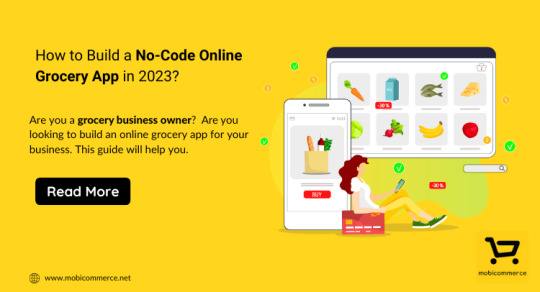
If you have a grocery store and you are looking to take your business to the next level, then this is the right time to invest in grocery mobile apps.
A report by Oberlo suggests that online grocery sales in the US are expected to reach $160.91 by 2023. Not only this, the revenue continues to surge to $235.86 billion by 2026.
Today, as you know, the life of everyone is very busy. Even, people get a bare amount of time to buy essential things. One of the things is grocery shopping, which is indeed necessary, but it consumes a lot of your time.
That’s where online grocery apps save lives or make the lives of people earlier. The grocery apps offer the comfort of shopping for groceries on their own with a few taps on mobile phones or tablets.
So, being a grocery business owner, if you are looking to build an online grocery app for your business. This guide will help you.
As a leading grocery mobile app development, we created this guide with the help of our grocery app expertise and business analysts to provide the right steps for development.
Here is the detailed article to get started.
Steps to Build an Online Grocery App With No-Code Tool
1. Identify the Target Audience and Business Goals for Your App
Before you start creating your grocery app, you must know about your audience. You should be aware of whom you are creating the app and what your end goals are. This will help you to shape your app with the needs and preferences of your target audience. Also, it will help you to create a grocery app that users want to use.
For example, you need to decide whether you are developing an app for business families or restaurants, or people having small businesses. At this stage, you need to understand your target audience and decide business goals to make decisions about your grocery business. In addition, it also helps you to decide on the features and functionalities of your B2B eCommerce software solutions. Further, you need to research the market and competitors.
2. Perform Market Research to Know the Trends and Your Competitors
So you are ready with the basic work of identifying your target audience and business goals, now you need to research the grocery apps market. Why? Performing research helps you to know the existing online grocery apps available in the market. Checking out these top grocery apps helps you to know which features you should include in your app and which not. Additionally, you are able to figure out what has been missed by your competitors. It even allows you to know what users are in new or updated versions of grocery apps.
Moreover, you get an idea of which business models to include in your app to generate profitable amounts. In short, researching helps you to identify opportunities and what mistakes to avoid in your apps. For example, while researching, you notice grocery apps' user experience is not suitable for a senior group of people or small businesses that regularly buy bulk groceries for their business.
3. Deciding Features of Your Grocery App
As you get a proper understanding of the grocery app market, you should now move further to decide the features you want to integrate into your grocery app. In addition, while deciding on the features, you need to know the interface of your mobile app. At this stage, preparing the interface and features is helpful to know how users will use your application.
To help you decide about the features, we have curated a list. Here is the list of features you should consider for your online grocery shopping app development.
Features of User App:
Search groceries
Checking grocery stores
Add to cart
Wishlist of groceries
Payment gateway
Order history
Order bills
Real-time order tracking
Ratings and reviews
Features of Delivery App:
Order management
GPS tracking
Status update
Delivery history
Digital wallet
Order delivery status
Features of Grocery Store Side App:
Inventory management
Order notification
Accept or reject orders
Manage payments
Customer support
View feedback
Features of Admin Panel:
Admin dashboard
Content management
Order management
Push notifications
Loyalty programs
Analytics
4. Create Wireframes and a Prototype
Once you are ready with all the documents and features that you want to integrate, now you need to design the wireframe for your app. Creating wireframes of your application helps you to know how your app will look. Wireframes help you to create a proper design for your application before you actually create a design.
Additionally, wireframes help you to design a proper online B2B software solution. After creating a wireframe, you can easily convert that into… Read more about How to Build a No-Code Online Grocery App in 2023?
#grocery mobile app development#B2B eCommerce software solutions#grocery shopping app development#B2B eCommerce software provider.
0 notes
Text
Top Ecommerce consulting firms in the USA
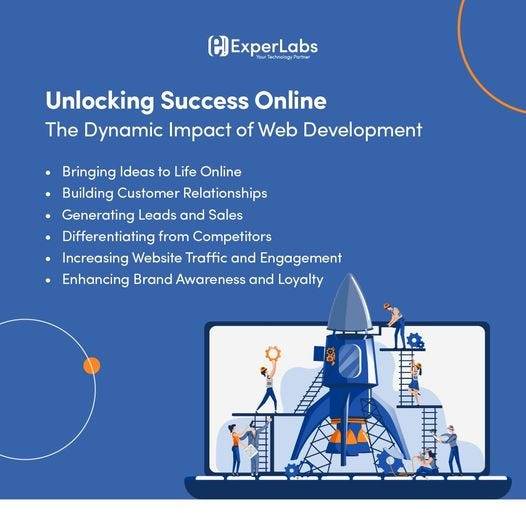
Comprehensive web development offerings design, for devices
Enhanced performance
Integration of content management systems (CMS)
Talk about a technological leap! We sure have come a long way with technology. #experlabs #funfacts…
Talk about a technological leap! We sure have come a long way with technology. #experlabs #funfacts #techfacts. Exper…www.facebook.com
Future-Proof Your Business with Scalable Cloud Solutions
Our Scalable Cloud Solutions are designed to grow with your business. We provide flexible, reliable, and efficient cloud services that adapt to your changing needs, ensuring you always have the resources to support your operations and innovations without compromising performance.
AWS Development Service Agency

Expert Cloud Setup and Maintenance Services
Ensure a seamless transition to the cloud with our Cloud Setup and Maintenance services. We handle everything from initial setup to ongoing maintenance, ensuring your cloud infrastructure is always optimized for performance, security, and scalability, allowing you to focus on your core business.
Award-Winning Best Ecommerce Consulting Agency
Partner with the Best Ecommerce Consulting Agency to elevate your online business. Our expert consultants provide strategic advice, technical solutions, and marketing insights to help you optimize your e-commerce platform, improve customer engagement, and increase sales.
High-Quality, Affordable Software Development Services
Access top-tier software development without breaking the bank with our Affordable Software Development Services. We deliver cost-effective, high-quality solutions tailored to your business needs, ensuring you get the best value for your investment while achieving your technology goals.
Seamless Salesforce B2B Store Setup for Your Business
Launch your B2B e-commerce platform effortlessly with our Salesforce B2B Store Setup services. We ensure a smooth implementation process, customized to meet your unique business needs, allowing you to efficiently manage your sales, inventory, and customer relationships on a powerful B2B platform.
Hassle-Free Salesforce Commerce Cloud Migration Services
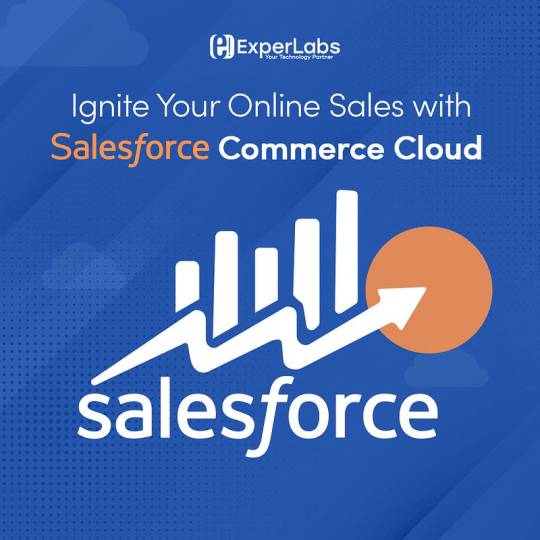
Leading Professional Web Development Firm
Partner with a Professional Web Development Firm that delivers cutting-edge solutions. Our team of skilled developers and designers create stunning, high-performance websites tailored to your business needs, ensuring an engaging user experience and robust online presence.
Expert Salesforce Commerce Cloud Setup Services
Get your e-commerce platform up and running quickly with our Salesforce Commerce Cloud Setup services. We provide comprehensive setup solutions, from initial configuration to final launch, ensuring your platform is optimized for performance, scalability, and customer engagement.
Comprehensive Salesforce B2B Ecommerce Solution
Transform your B2B sales with our Salesforce B2B Ecommerce Solution. We offer end-to-end services including setup, customization, and optimization to help you build a powerful B2B e-commerce platform. Enhance your sales processes, improve customer relationships, and drive business growth with our tailored solutions.
Leading Web Development Agency for Your Digital Needs
Transform your online presence with our leading Web Development Agency. Our expert team specializes in creating custom, high-performance websites tailored to your business goals. We focus on delivering visually appealing, user-friendly, and SEO-optimized websites that engage visitors and drive conversions.
Expert Custom Software Development Solutions
Drive innovation with our expert Custom Software Development solutions. Our experienced developers create tailored software that addresses your unique business requirements, enhancing efficiency and scalability. From concept to deployment, we deliver high-quality software that aligns with your strategic objectives.
E-commerce platform development
Regular updates and security patches
Comprehensive Web Development Services for Every Business
Enhance your digital footprint with our comprehensive Web Development Services. We offer end-to-end solutions including website design, development, and maintenance. Our team ensures your site is responsive, secure, and optimized for performance, providing an exceptional user experience and supporting your business growth.
0 notes
Text
Enhancing B2B Efficiency: Exploring Custom Ecommerce Website Development Services
In the dynamic landscape of modern commerce, businesses are continually seeking innovative solutions to streamline their operations, enhance customer experience, and stay ahead of the competition. One such solution gaining momentum is the utilization of Custom Ecommerce Website Development services. In the realm of B2B transactions, where complexities abound, custom ecommerce websites offer tailored solutions that cater specifically to the unique needs of businesses.
Understanding B2B Custom Ecommerce Website Development Services
Custom Ecommerce Website Development services are tailored solutions designed to meet the specific requirements of B2B businesses. Unlike off-the-shelf solutions, custom ecommerce websites are built from the ground up, considering the intricate workflows, diverse product catalogs, and complex pricing structures inherent in B2B transactions. These services encompass a wide range of functionalities, including but not limited to:
Personalized User Experience: Custom ecommerce websites are designed to offer a personalized user experience tailored to the needs of each business. From intuitive navigation to customized product displays, every aspect of the website is optimized to enhance user engagement and facilitate seamless transactions.
Integration Capabilities: B2B transactions often involve intricate backend systems such as ERP (Enterprise Resource Planning) and CRM (Customer Relationship Management) software. Custom ecommerce website development services incorporate robust integration capabilities, allowing seamless connectivity with existing systems to streamline operations and data management.
Flexible Pricing Structures: B2B pricing models can vary significantly, with factors such as volume discounts, contract pricing, and negotiated terms influencing the final cost. Custom ecommerce websites enable businesses to implement flexible pricing structures, accommodating complex pricing models while ensuring accuracy and transparency in transactions.
Scalability and Customization: As businesses evolve and expand, their ecommerce needs may change accordingly. Custom ecommerce website development services offer scalability and flexibility, allowing businesses to adapt their online platforms to accommodate growth, integrate new features, and meet evolving customer demands.
The Advantages of Custom Ecommerce Website Development Services for B2B Businesses
Enhanced Efficiency: By tailoring the ecommerce platform to the specific requirements of B2B transactions, custom development services streamline the buying process, reduce manual intervention, and minimize errors, leading to improved operational efficiency.
Improved Customer Experience: Custom ecommerce websites offer a superior user experience, with intuitive interfaces, personalized product recommendations, and seamless checkout processes. This fosters customer satisfaction and loyalty, driving repeat business and fostering long-term relationships.
Increased Sales and Revenue: With features such as targeted marketing campaigns, cross-selling opportunities, and advanced analytics, custom ecommerce websites empower B2B businesses to identify and capitalize on sales opportunities, driving revenue growth and profitability.
Competitive Advantage: In a crowded marketplace, differentiation is key to standing out from the competition. Custom ecommerce website development services allow businesses to create unique online experiences that resonate with their target audience, giving them a competitive edge in the market.
Conclusion
In the rapidly evolving landscape of B2B commerce, custom ecommerce website development services have emerged as a powerful tool for businesses looking to optimize their online presence, streamline operations, and drive growth. By offering tailored solutions that cater to the specific needs of B2B transactions, these services enable businesses to enhance efficiency, improve customer experience, and gain a competitive advantage in the market. As the demand for personalized ecommerce solutions continues to grow, investing in custom development services has become increasingly essential for B2B businesses looking to thrive in the digital age.
0 notes
Text
OpenTeQ Top NetSuite Services Provider: Empowering Businesses with Cloud Solutions

In the evolving business landscape, the need for comprehensive cloud-based solutions has become paramount. NetSuite, as a leading provider of cloud ERP solutions, has revolutionized the way companies operate. Central to the deployment and effective use of NetSuite's suite of applications are NetSuite Services Providers. These specialized companies offer a range of NetSuite Solutions, including the renowned NetSuite Accounting Software, to ensure businesses can fully leverage the power of cloud computing.
The Role of NetSuite Solutions Providers
NetSuite Solutions Providers are at the forefront of offering bespoke services that cater to the unique business needs of various industries. These providers are not just vendors but partners that facilitate the transformation of a company's operations through:
Expert Implementation: Tailoring NetSuite's comprehensive ERP suite to fit the specific workflows of a business.
Customization and Integration: Enhancing the default capabilities of NetSuite to better align with client requirements and integrating with existing systems for seamless functionality.
Ongoing Support: Providing continuous assistance to ensure the NetSuite environment evolves with the business, offering NetSuite Support Services that cover technical issues, upgrades, and optimizations.
The Importance of NetSuite Accounting Software
For many businesses, accounting is the core component that benefits from the transition to a cloud-based system like NetSuite. NetSuite Accounting Software delivers a unified platform where financial operations are transparent, compliant, and connected to all other business functions. It is a robust solution for managing financial transactions, reporting, and compliance, ensuring real-time visibility into the financial health of an organization.
Comprehensive NetSuite Services
NetSuite Services extend beyond accounting to encompass a wider array of business functions:
CRM and Ecommerce Solutions: Providing tools to manage customer relationships and online sales channels effectively, whether B2B or B2C.
Resource and Timesheet Management: Offering solutions for managing both human and material resources efficiently.
Analytics and Reporting: Delivering insights through advanced reporting tools and dashboards to assist in strategic decision-making.
Selecting the Right NetSuite Services Company
A NetSuite Services Company must be chosen with care, considering their experience, expertise, and track record of successful implementations. Companies looking for NetSuite Services should look for:
Industry Experience: Providers with a deep understanding of your specific industry can deliver more targeted solutions.
Certifications and Reviews: Accreditation and positive feedback from previous clients can be a good indicator of a provider's capabilities.
Scope of Services: Ensure that the provider offers comprehensive services, from implementation to support, to cover all your NetSuite needs.
Top NetSuite Services Providers
Among the numerous providers, companies like Sunrise Integration, Serra, and Scale North have emerged as leading top NetSuite Services Providers. They offer end-to-end NetSuite services, from initial consultation and system implementation to ongoing support and optimization, proving to be valuable allies for businesses aiming to thrive in the digital age.
Sunrise Integration: Known for its agile-focused approach, expert design, and development capabilities, including mobile and API integrations.
Serra: A global provider with a comprehensive suite of services that empower businesses in their digital transformation efforts.
Scale North: A dynamic management and consulting firm that offers strategic transformation services to help businesses grow and succeed with NetSuite.
Conclusion:
OpenTeQ Group stands out as a leading Top NetSuite services provider, offering tailored solutions to meet diverse business needs. Our commitment to excellence and customer satisfaction drives every aspect of our service delivery. With a dedicated team of NetSuite experts, we ensure seamless implementation, optimization, and ongoing support. As a trusted partner, we empower businesses to harness the full potential of NetSuite, driving efficiency and growth. Choose OpenTeQ Group as your NetSuite services partner and unlock unparalleled expertise and innovation. Elevate your business with our proven track record of success and commitment to delivering results. Experience the difference with OpenTeQ Group, your trusted NetSuite services provider.
#NetSuite Services#NetSuite Solutions Provider#NetSuite Implementation partner#NetSuite ERP Consulting#NetSuite ERP Implementation#NetSuite Consultation#NetSuite Support Services#NetSuite Integration Platform#NetSuite Implementation Consultant#NetSuite Technical Consultant#NetSuite Development#NetSuite Integration#NetSuite Developer#NetSuite Implementation Company#NetSuite Development Company#NetSuite ERP Support#NetSuite Project Implementation#NetSuite ERP Solution Provider#NetSuite Accounting Software#NetSuite Financial Software#NetSuite SP Partner#NetSuite Solution Provider Partner#NetSuite BPO Partner#NetSuite Customization#NetSuite Data Migration#NetSuite Consulting#Certified NetSuite Partner#NetSuite Accounting Partner#NetSuite CRM#NetSuite Customer Support & Customization
0 notes
Text
Ecommerce Microservices Architecture for Modern Solutions
Is your ecommerce marketplace slow, inflexible, and difficult to update? Are you struggling to keep up with the competition's ability to innovate and grow?
If this is the case, then the ecommerce microservices architecture might be the answer you've been looking for.
Conventional E-commerce systems may impede progress. In contrast, the modular architecture provided by ecommerce microservices can substantially enhance the performance and adaptability of your online store.
This blog will explain microservices in plain English, highlight their unique benefits for e-commerce, and offer helpful advice for anyone thinking about making this architectural change.
What is Microservices-Based Architecture in Ecommerce?
The traditional ecommerce platform is one big program. Product listings, shopping carts, and checkout are integrated into one codebase. This works for smaller stores but becomes cumbersome as your business grows, especially if you want to manage ecommerce multi-stores.
Microservices divide your ecommerce platform into smaller programs. Each microservice manages product data, payments, or customer accounts. Modularity benefits B2C and B2B ecommerce businesses. APIs allow these microservices to communicate.
Business Benefits of Ecommerce Microservices Architecture
Effective e-commerce relies heavily on providing customers with a seamless and gratifying experience. The architecture of microservices enables you to do precisely that. A few advantages can be derived from it.
Technological Freedom
You can break free from the antiquated tech stack of a monolith with microservices. With the newest frameworks and tools, create sleek, intuitive storefronts. Conversion rates will increase as a result of quicker, more interesting experiences.
Accelerated Development
With microservices, small, focused teams can work on different parts of your ecommerce application in parallel. This speeds up development cycles, allowing you to launch new features, enter new markets at an accelerated pace, and streamline your ecommerce app development processes.
Phased Investment and Prioritization
You can easily break free from costly, all-at-once platform migrations. Microservices let you modernize incrementally, starting with the areas that impact customer experience the most (search, checkout, etc.), maximizing ROI.
Scalability on Demand
Traffic to ecommerce is unpredictable. Microservices optimize costs and performance by scaling individual components, like the product catalog during a flash sale, without overprovisioning the system. This flexibility simplifies future ecommerce software development because you can improve specific components without disrupting the system.
Improved Resiliency
It is less likely that an issue with one microservice will bring down your entire store. This results in higher uptime, fewer lost sales, and a more dependable online shopping environment that fosters client confidence.
Cloud Cost Optimization
Microservices are cloud-friendly by nature. This lets you host each service on the cloud Solutions that best suits its needs. This boosts performance and may reduce infrastructure costs.
Use Cases of Microservices Architecture in Ecommerce
An e-commerce microservices architecture has numerous applications. These are the most significant ones.
Product Catalog
Everything about your product information is taken care of by a dedicated microservice. This includes descriptions, images, inventory levels, prices, and more. This lets you fine-tune how this data is stored and retrieved, so your product pages load incredibly quickly and your large catalogs work well.
Search and Filtering
Complex product search can be its microservice, with options to filter by different attributes or get personalized suggestions. This service can be scaled up or down on its own to handle large queries, and it uses advanced search technologies (such as Elasticsearch) to run at its best.
Shopping Cart and Checkout
Separate the sensitive steps of adding items to a cart, applying discounts, and finally processing payments into their small services. This makes your e-commerce site safer and lets you change the way people check out without affecting other parts of it.
Customer Account Management
User profiles, order histories, addresses, and loyalty program information are handled by microservices. By doing this, you can offer personalized experiences (like viewing previous orders) and maintain the organization of customer data without slowing down other areas of your website.
Technological Integrations in Ecommerce Microservices Architecture
This contemporary e-commerce architecture needs strong support to function flawlessly, just like any other complex system. Here are some significant technology integrations that offer a strong starting point.
API Gateways
These serve as your microservices system's "front door". In addition to handling incoming requests and forwarding them to the appropriate service, they also take care of security and authentication. This makes it easier for your front-end application to communicate with various back-end services.
Containerization (Docker)
Consider containers to be your microservices' lightweight packages. Docker facilitates the easy packaging of all dependencies for a service, ensuring consistent operation across development, testing, and production environments.
Orchestration (Kubernetes)
Things get complex when you have many microservices running! Kubernetes manages the deployment of your containerized services, acting as an automated conductor. Additionally, it can self-heal if something goes wrong and scales it up or down as necessary.
Service Meshes
Microservices can now intelligently communicate with one another thanks to a service mesh. They manage tasks like secure communication, monitoring, and load balancing (which effectively distributes traffic), which improves system dependability and manageability.
How to Migrate From a Monolithic to a Microservices Architecture in Ecommerce
Clearly Define Your Goals
Make sure you fully understand why microservices are the solution before starting a potentially difficult e-commerce migration. Do you have issues with scalability? Is a disorganized codebase the cause of slow development? Your migration plan will be guided by identifying these pain points, proving that microservices are the best option overall.
Evaluate Your Existing Platform
Assess your ecommerce architecture. This involves mapping functions, data dependencies, and interactions. Creating a migration roadmap requires knowing your starting point. If you lack in-house resources, consider hiring an ecommerce management company for expert guidance during this assessment.
Prioritization is Key
Not all parts of your ecommerce platform are created equal. Identify areas that will benefit most from becoming independent microservices. Prime candidates include frequently accessed functionalities, sections experiencing bottlenecks, or areas where you plan to leverage a new technology that wouldn't integrate well with the monolith. This strategic approach will streamline your ecommerce website development in the future.
Incremental Wins
Avoid the temptation of a "big bang" rewrite where you attempt to move your entire monolith to microservices overnight. Instead, take an incremental approach, migrating functionalities in stages. This allows you to test, learn, and refine as you go.
Strangler Fig Pattern
A successful technique for migrating in stages is the strangler fig pattern. The idea is to gradually build new microservices alongside the existing monolith. Then, you slowly route traffic away from the monolith parts toward the corresponding microservices. This lets you run both systems in parallel during the transition, minimizing risk.
Data Consistency is Paramount
As you decouple your monolith into microservices, careful data management is crucial. Plan how data will be shared and synchronized between the remaining monolith components and the new microservices.
Rigorous Testing is Essential
As the number of services and interactions grows, so does the testing complexity. Implement unit tests for individual microservices and integration tests to verify how they interact with each other.
Performance Metrics Matter
Keep a close eye on how your microservices are performing. Monitor response times, resource utilization, and error rates to identify areas for optimization or potential problems.
Migrate to Ecommerce Microservices Architecture with Narola Infotech
The shift to microservices often necessitates a cultural shift towards DevOps principles. That means you need a technological partner who prioritizes continuous integration and continuous delivery (CI/CD) practices, and empowers teams to own and be accountable for the performance of their microservices.
In this regard, Narola Infotech is the reliable partner you are looking for. We offer expert ecommerce consulting services alongside our technical expertise. Our Agile and DevOps approach helps us easily tackle any complex project. With 18+ years of experience under our belt and a keen eye for emerging trends, there is hardly any ecommerce challenge that we haven’t overcome.
Feel free to contact our experts if you wish to discuss your project.
Read more: Ecommerce Replatforming: Shopify to Custom Ecommerce Platform
#ecommerce microservices architecture#ecommerce microservice architecture#Ecommerce architecture#Modern ecommerce architecture#Monolithic vs microservice architecture
0 notes
Text
The Evolution of E-Commerce: AI-Powered Personalization and AR Shopping
The E-Commerce landscape has changed over time. It started as a way to shop from the comfort of home, but it has now grown to encompass everything from social commerce to virtual reality shopping. Moreover, advances in AI and augmented reality have allowed brands to provide personalized shopping experiences that meet consumers’ expectations.
In this article, we will look at how ecommerce has evolved over the years, what is driving its future growth, and the opportunities that lie ahead for both marketers and consumers alike. The evolution of ecommerce has been accelerated by technological advancements, and today’s businesses are embracing these technologies in order to meet their customers’ demands.

The internet revolutionized the way we buy and sell things, changing both how we consume and how we make money. Ecommerce has been fueled by innovations such as electronic directories and search engines for finding information on the Web; software agents, or bots, that act autonomously to find goods and services; and digital authentication services that vouch for identities over the Internet.
Ecommerce is now a global industry with a market size of more than $5 trillion, accounting for more than a fifth of all retail sales worldwide. It has tech ogle expanded through innovations such as omnichannel retailing, B2B and B2C marketplaces, mobile shopping, online payment encryption, and advanced supply chain management systems. Despite slowing revenue growth, ecommerce continues to evolve as the Internet of Things, artificial intelligence (AI), and augmented reality (AR) drive new marketing dynamics in the online retail space.
Online shoppers are demanding personalized shopping experiences that align with their specific needs and preferences. These personalized shopping experiences are delivering better engagement, increasing conversions, and reducing customer churn rates. This is because customers feel as though they are being understood and appreciated by the brand.
As a result of these trends, the bar for eCommerce companies has been raised to deliver near-unanimous shopper satisfaction and loyalty. In order to do this, they need to leverage the power of AI to optimize their ecommerce sites and create a seamless shopping experience for their customers.
Personalization has become the key to success in ecommerce, and AI is the driver that can enable it. By analyzing user behavior such as clicks, shopping carts, purchasing history, and search queries, AI can help businesses offer relevant products and recommendations that match each individual’s unique interests and needs.
As a result, ecommerce companies that utilize AI-powered personalization are better able to convert site visitors into loyal customers and generate higher revenues. This is why a growing number of retailers are technology news adopting these solutions to improve the customer experience and grow their ecommerce revenue. However, it is important to note that not all AI-powered personalization is created equal. To get the most out of your personalization efforts, it is crucial to implement an AI solution that is built to scale and provides actionable insights based on real-time user data. This will ensure that your AI-powered personalization is effective and can scale to fit the needs of your entire customer base.
1 note
·
View note